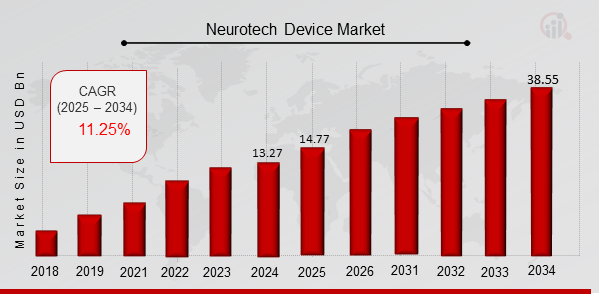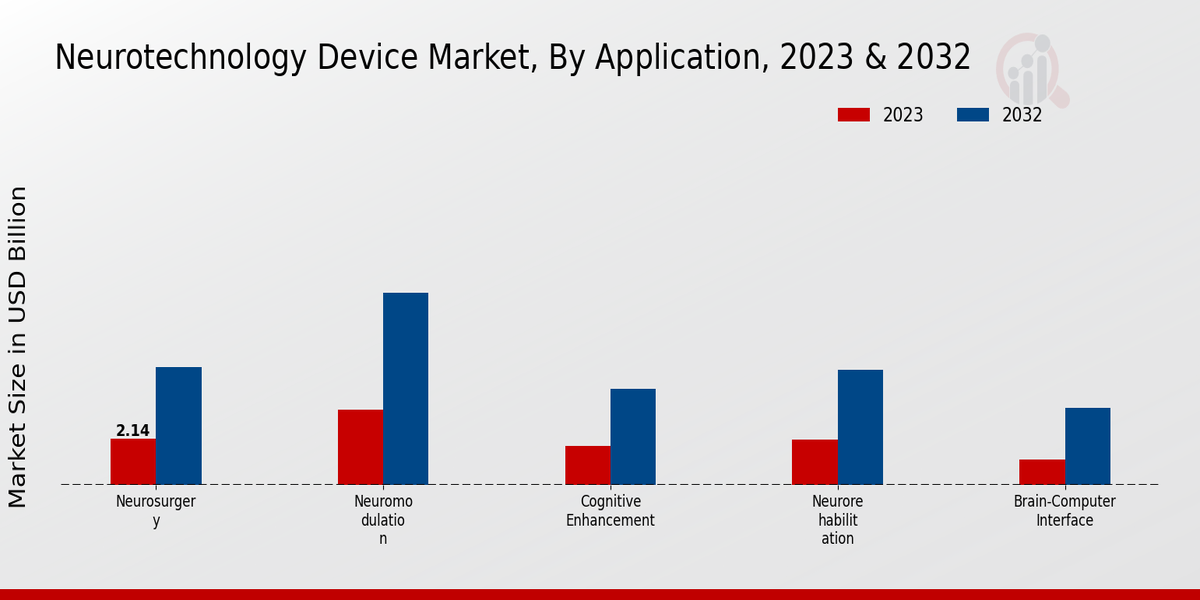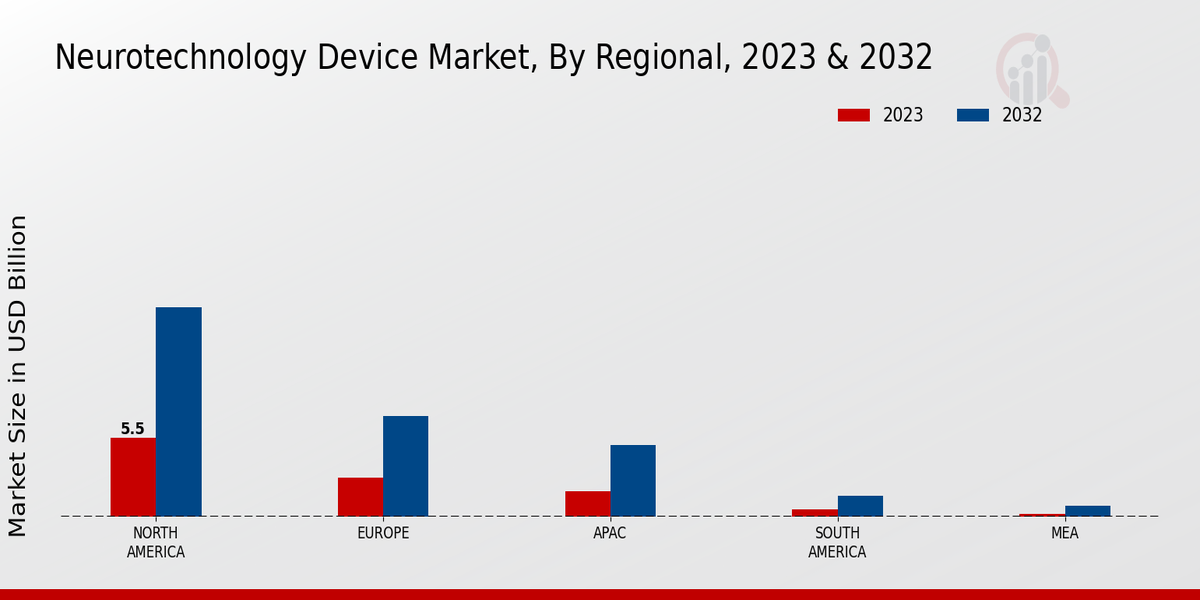Neurotechnology Device Market Overview
As per MRFR analysis, the Neurotech Device Market Size was estimated at 13.27 (USD Billion) in 2024. The Neurotech Device Market Industry is expected to grow from 14.77 (USD Billion) in 2025 to 38.55 (USD Billion) till 2034, at a CAGR (growth rate) is expected to be around 11.25% during the forecast period (2025 - 2034).
Key Neurotechnology Device Market Trends Highlighted
The global neurotechnology device market is experiencing significant growth driven by the increasing prevalence of neurological disorders, rising awareness of mental health issues, and advancements in neuroengineering technologies.
The demand for effective treatment options and diagnostic tools has led to innovations such as brain-computer interfaces and neurostimulation devices. Moreover, the growing investment in research and development by both public and private sectors is further propelling market expansion.
There are numerous opportunities to be captured within this market, particularly in areas like personalized medicine and remote monitoring solutions.
As technology improves, there is potential for integrating neurotechnology with artificial intelligence, enhancing the efficacy of devices used for therapeutic purposes. Emerging markets also present a unique chance for expansion as healthcare systems worldwide seek to address the increasing burden of neurological conditions.
Trends in recent times include the increasing use of wearable neurotechnology devices that allow for continuous monitoring and real-time data collection. This has led to a shift in focus from conventional treatment methods to more proactive approaches to managing neurological health.
Additionally, there is a rising interest in neurotechnology applications within areas such as cognitive enhancement and neurofeedback therapy, reflecting a broader acceptance of these solutions in everyday life.
The convergence of neuroscience, technology, and healthcare is creating a dynamic environment ripe for innovation, promising long-term benefits for patients and healthcare providers alike. As the market evolves, it will be crucial to address regulatory challenges and ensure the ethical application of these advanced technologies to foster trust and acceptance among users.

Source: Primary Research, Secondary Research, MRFR Database and Analyst Review
Neurotechnology Device Market Drivers
Rising Prevalence of Neurological Disorders
One of the foremost drivers influencing the growth of the global neurotechnology device market is the escalating prevalence of neurological disorders across the globe. Conditions such as epilepsy, Parkinson's disease, Alzheimer's disease, and traumatic brain injuries are becoming increasingly common, affected by aging populations and lifestyle changes.
This rise in incidence necessitates enhanced diagnostic and therapeutic solutions, thereby fostering significant demand for neurotechnology devices.
As the medical community pushes toward better treatment methodologies, the use of neurostimulation devices and diagnostic tools becomes crucial. Furthermore, the urgency for effective management of these disorders drives innovation within the industry, promoting the development of advanced technologies such as brain-computer interfaces, deep brain stimulation, and neuroimaging devices.
These technologies not only aim to improve patient outcomes but also open new avenues for research, hence increasing investments and collaborations among various stakeholders in the global neurotechnology device market.
As more institutions undertake studies that require neurotechnological insights, the cumulative impact on market expansion becomes pronounced, reflecting in the rapidly evolving landscape of neurological treatments tailored to meet growing patient needs.
This continuous rise in demand is anticipated to create a robust market environment for neurotechnology devices in the upcoming years.
Technological Advancements in Neurotechnology
Technological advancements play a significant role in driving the global neurotechnology device market forward. Remarkable innovations such as miniaturized and highly efficient neurostimulation systems, brain-computer interfaces, and enhanced neuroimaging techniques have improved both treatment efficacy and patient accessibility.
For instance, portable devices allowing remote monitoring of neurological conditions empower patients and healthcare professionals alike.
These advancements not only enhance clinical outcomes but also decrease the cost of management. As technology evolves, new opportunities for novel applications in neurology arise, opening pathways for research and development that were unachievable earlier.
The continuous integration of artificial intelligence and machine learning into neurotechnology also fosters enhanced precision in diagnostics and treatment personalization.
Growing Investment and Funding in Neurotechnology Research
The surge in investment and funding directed towards neurotechnology research significantly propels the global neurotechnology device market. With an increasing number of public and private entities recognizing the necessity for innovations in neurotechnology, financial support is vital for fostering groundbreaking research and driving product development.
Venture capitalists and governmental organizations are channeling resources into startups and research institutes focused on neurotechnology, aiming to prop up the advancement of new devices and solutions. As a result, many budding companies are emerging, contributing to a competitive landscape that incentivizes innovation and accelerates market expansion.
Neurotechnology Device Market Segment Insights
Neurotechnology Device Market Application Insights
The application segment is crucial in addressing various neurological disorders and enhancing cognitive functioning.
In this sector, Neurosurgery, valued at 2.14 USD billion in 2023, is witnessing significant importance, particularly due to advancements in surgical techniques and technologies such as neurostimulation and robotic interventions that are improving patient outcomes.
The Neuromodulation application holds a valuation of 3.5 USD billion in 2023, which underscores its dominant position in the market, driven by the increasing prevalence of neurological disorders such as epilepsy, depression, and chronic pain conditions. It is significant as it enhances the quality of life through innovative treatments that modify neurological activity.
Cognitive Enhancement was reflected with a market value of 1.8 USD billion in 2023, marking its emerging role as individuals seek to improve mental performance for academic and occupational success. Neurorehabilitation was another vital aspect, currently valued at 2.1 USD billion, and reflects notable growth opportunities through technologies that facilitate recovery post-stroke and brain injuries.
Finally, the Brain-Computer Interface segment, valued at 1.18 USD billion, showcased burgeoning interest as it provides methods for direct communication between the brain and external devices, which is significant for individuals with mobility impairments.
Each application contributes uniquely to the overall market growth, with Neurosurgery and Neuromodulation together capturing the majority holding of the overall market.
As the global neurotechnology device market evolves, these application segments present numerous growth opportunities driven by innovative technological advancements, changing healthcare needs, and rising investments in neurotechnology research.

Source: Primary Research, Secondary Research, MRFR Database and Analyst Review
Neurotechnology Device Market Device Type Insights
The global neurotechnology device market is poised for substantial growth, driven by advancements in both Invasive and Non-Invasive Devices.
Invasive Devices play a crucial role in advanced medical procedures, offering high accuracy and efficacy in treatment protocols, while Non-Invasive Devices are increasingly popular for their ease of use and patient comfort, leading to a broader market appeal. Implantable Devices serve critical functions in long-term monitoring and therapeutic applications, showcasing their importance in chronic conditions.
Wearable Tracking Devices are revolutionizing patient care by enabling real-time health tracking and encouraging preventive measures. As the global neurotechnology device market segmentation continues to evolve, these device types create pathways for innovation, with a growing focus on enhancing patient outcomes and expanding access to neurotechnology solutions.
The market growth is also supported by rising investments in research and development, along with increasing awareness of neurological disorders and their impacts. These trends underscore the significance and dynamic nature of the Device Type landscape within the broader global neurotechnology device market.
Neurotechnology Device Market End User Insights
The market comprises multiple segments like Hospitals, Research Institutions, Home Care Settings, and Rehabilitation Centers. Hospitals play a crucial role as they utilize advanced neurotechnology devices for diagnosis and treatment, attracting a significant share of the market.
Research Institutions are vital for innovation and development, contributing to the evolution of neurotechnologies and increasing their applicability in clinical settings.
Home Care Settings have gained traction, offering convenience and personalized care, which enhances patient comfort and monitoring. Rehabilitation Centers are essential for patient recovery processes, leveraging neurotechnology to facilitate recovery from neurological disorders and injuries.
The overall demand driven by an aging population, rising prevalence of neurological conditions, and advancements in technology are propelling the market forward, ultimately leading to increased global neurotechnology device market revenue.
Overall, this diversified segmentation highlights the broad application and relevance of neurotechnology across multiple sectors, presenting significant growth drivers and opportunities within the industry.
Neurotechnology Device Market Technology Insights
Among the technology landscape, key areas such as Electroencephalography (EEG) and Functional Magnetic Resonance Imaging (fMRI) play crucial roles in brain activity monitoring and diagnostics.
Transcranial Magnetic Stimulation (TMS) has emerged as a significant non-invasive treatment modality, contributing to therapeutic interventions for various neurological disorders. Deep Brain Stimulation (DBS) is also remarkable in providing solutions for movement disorders and psychiatric conditions.
The advancements in these technologies are driven by the increasing prevalence of neurological disorders and rising awareness of neurotechnology's potential. The overall market growth can be attributed to the expanding applications of these devices in clinical settings and ongoing research into neural processes.
This technology segment exemplifies innovation and is set to dominate the global neurotechnology device market due to its essential role in both diagnostics and treatment strategies.
Neurotechnology Device Market Regional Insights
The global neurotechnology device market exhibits substantial growth across various regions, with North America dominating the landscape, valued at 5.5 USD billion in 2023 and projected to reach 14.5 USD billion by 2032. This prominence is fueled by advanced healthcare infrastructure and significant investments in research and development.
Europe followed as the second largest market, reporting a value of 2.7 USD billion in 2023 and expected to grow to 7.0 USD billion by 2032, showcasing strong innovation in neurotechnology solutions. APAC was emerging steadily, with a valuation of 1.8 USD billion in 2023 and anticipated growth to 5.0 USD billion, driven by rising healthcare demands and technological advancements.
South America, while smaller at 0.5 USD billion in 2023, is projected to expand to 1.5 USD billion, presenting growth opportunities as awareness of neurotechnology increases. The Middle East and Africa (MEA) represented a nascent market with a value of 0.22 USD billion in 2023, expected to reach 0.8 USD billion, highlighting the potential for development in these regions.
Overall, the global neurotechnology device market revenue reflects a diverse landscape with unique regional dynamics and growth drivers.

Source: Primary Research, Secondary Research, MRFR Database and Analyst Review
Neurotechnology Device Market Key Players and Competitive Insights
The global neurotechnology device market is characterized by rapid technological advancements and innovations that are transforming the way neurological disorders and conditions are treated.
As a sector that encompasses a wide range of devices, from neurostimulation systems to brain-computer interfaces, the competitive landscape is marked by both established medical device manufacturers and emerging startups.
Market players are focusing on strategic partnerships, mergers, and acquisitions to enhance their product offerings and gain a significant share of the market. The increasing prevalence of neurological diseases and disorders, coupled with a growing awareness of neurotechnology among healthcare professionals, is driving the demand for devices that can provide effective and innovative solutions.
As a result, companies are continually investing in research and development to stay ahead of the competition and meet the needs of patients more efficiently.
Nervtech has established a strong presence within the global neurotechnology device market through its commitment to innovation and high-quality product development. The company specializes in advanced neurostimulation devices that address a variety of neurological conditions, positioning itself as a leader in this rapidly evolving sector.
With a solid research foundation, Nervtech is well-regarded for its robust clinical data, demonstrating the efficacy and safety of its devices. Additionally, the company's focus on user experience and patient engagement has contributed to its competitive advantage, ensuring that its products not only deliver therapeutic benefits but are also user-friendly and accessible.
This combination of technological prowess and commitment to patients' needs enables Nervtech to maintain a strong foothold in the market while attracting the attention of healthcare providers and patients alike.
Cynapsus Therapeutics operates with a clear focus on developing groundbreaking solutions within the global neurotechnology device market, specifically targeting conditions that affect cognition and mental well-being.
The company's innovative approach to neurotechnology is evident in its commitment to research-backed solutions that cater to patients suffering from neurological disorders. Cynapsus Therapeutics emphasizes the importance of explicit efficacy in its product portfolio, showcasing devices that aim to enhance cognitive functions and improve the quality of life for patients.
The organization actively collaborates with research institutions and clinicians, which enhances its market presence and strengthens its reputation as a reliable player in the neurotechnology landscape. Furthermore, Cynapsus Therapeutics' dedication to advancing the field through rigorous clinical trials and studies demonstrates its potential as a key contributor to the future of neurotechnology solutions.
Key Companies in the neurotechnology device market include
- Nervtech
- Cynapsus Therapeutics
- Blackrock Neurotech
- Soterix Medical
- Boston Scientific
- Medtronic
- Abbott Laboratories
- BrainCo
- Eko Devices
- Synchron
- Cerebrotech Medical Systems
- NeuroPace
- Harrow Health
Neurotechnology Device Market Developments
The global neurotechnology device market is experiencing several noteworthy developments. Recently, companies like Nervtech and Blackrock Neurotech have made strides in enhancing their device offerings, focusing on neurostimulation and brain-computer interface technologies.
Cynapsus Therapeutics is advancing its therapeutic solutions, contributing to a more expansive treatment landscape for neurological disorders. In acquisitions, Soterix Medical and Boston Scientific have solidified their positions through strategic collaborations, enhancing their technology portfolios.
Medtronic, known for its significant market presence, has been expanding its neurotech division, and Abbott Laboratories is also increasing its investment in innovative neurodevices aimed at improving patient outcomes.
Moreover, companies like NeuroPace and BrainCo are gaining attention for their innovative approaches to managing neurological conditions. The market’s growth is reportedly tied to increasing investment in research and development among these firms, alongside rising demand for advanced neuromodulation devices.
This surge in market valuation is impacting not only the competitive landscape but also driving advancements that could redefine treatment avenues for various neurological conditions.
Neurotechnology Device Market Segmentation Insights
Neurotechnology Device Market Application Outlook
- Neurosurgery
- Neuromodulation
- Cognitive Enhancement
- Neurorehabilitation
- Brain-Computer Interface
Neurotechnology Device Market Device Type Outlook
- Invasive Devices
- Non-Invasive Devices
- Implantable Devices
- Wearable Devices
Neurotechnology Device Market End User Outlook
- Hospitals
- Research Institutions
- Home Care Settings
- Rehabilitation Centers
Neurotechnology Device Market Technology Outlook
- Electroencephalography
- Functional Magnetic Resonance Imaging
- Transcranial Magnetic Stimulation
- Deep Brain Stimulation
Neurotechnology Device Market Regional Outlook
- North America
- Europe
- South America
- Asia Pacific
- Middle East and Africa
| Report Attribute/Metric |
Details |
|
Market Size 2024
|
13.27 (USD Billion)
|
|
Market Size 2025
|
14.77 (USD Billion)
|
|
Market Size 2034
|
38.55 (USD Billion)
|
|
Compound Annual Growth Rate (CAGR)
|
11.25 % (2025 - 2034)
|
|
Report Coverage
|
Revenue Forecast, Competitive Landscape, Growth Factors, and Trends
|
|
Base Year
|
2024
|
|
Market Forecast Period
|
2025 - 2034
|
|
Historical Data
|
2020 - 2024
|
| Market Forecast Units |
USD billion |
| Key Companies Profiled |
Nervtech, Cynapsus Therapeutics, Blackrock Neurotech, Soterix Medical, Boston Scientific, Medtronic, Abbott Laboratories, BrainCo, Eko Devices, Synchron, Cerebrotech Medical Systems, NeuroPace, Harrow Health |
| Segments Covered |
Application, Device Type, End User, Technology, Regional |
| Key Market Opportunities |
Wearable neurotechnology solutions, Neurorehabilitation devices advancement, AI integration in neuro devices, Enhanced diagnostics through neuroimaging, Neurostimulators for pain management |
| Key Market Dynamics |
Technological advancements in devices, Increasing neurological disorders prevalence, Rising demand for brain-computer interfaces, Expanding applications in mental health, Growing investment in neurotechnology research |
| Countries Covered |
North America, Europe, APAC, South America, MEA |
Frequently Asked Questions (FAQ) :
The global neurotechnology device market is expected to be valued at 38.55 USD billion by 2034.
The market is expected to grow at a CAGR of 11.25% from 2025 to 2034.
North America is expected to dominate the market with an expected value of 14.5 USD billion by 2032.
The neuromodulation segment is projected to reach a market size of 9.0 USD billion by 2032.
Key players in the market include Medtronic, Boston Scientific, Abbott Laboratories, and Blackrock Neurotech, among others.
The neurorehabilitation segment is expected to reach a market size of 5.4 USD billion by 2032.
The Brain-Computer Interface segment is projected to grow to 3.6 USD billion by 2032.
The market size for Europe is expected to reach 7.0 USD billion by 2032.
The Neurosurgery segment is projected to have a market size of 5.5 USD billion by 2032.
The APAC region is expected to have a market size of 5.0 USD billion by 2032.

















